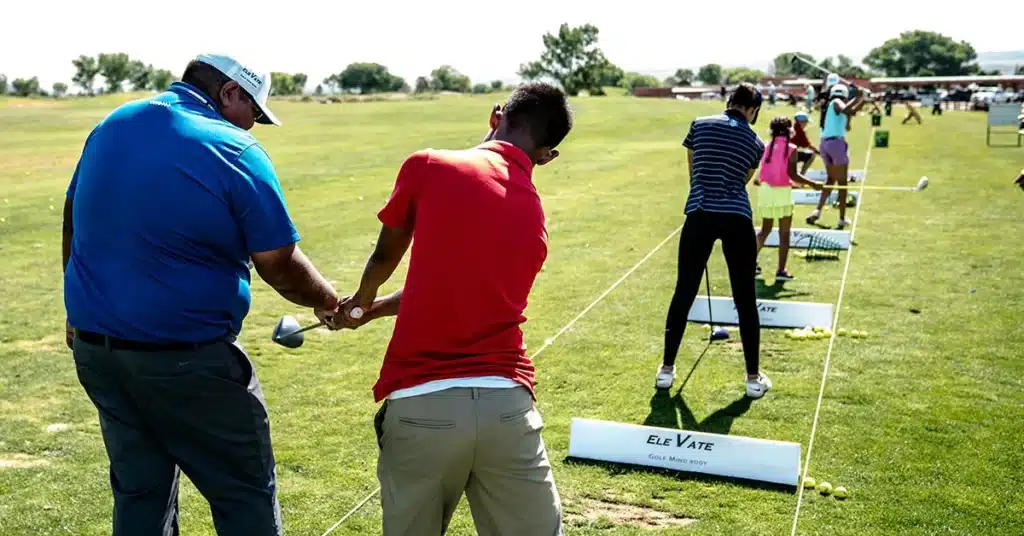When you first set foot on a golf course, it’s easy to fall in love with the game’s beauty and wonder, “Is golf hard to learn?” After all, what’s the point of playing Golf if you can’t enjoy the beautiful scenery and the calming rhythm of the swing? Once considered a gentleman’s game, Golf is an intricate tapestry where mastering the game requires a delicate dance of skill, patience, and strategy.
Golf isn’t just about hitting a golf ball into a hole. It’s about the intricate orchestration that goes into every aspect of the game—from choosing the right club to mastering difficult terrain, mastering the art of putting, and so much more.
As the pros make Golf look easy, the question remains: Is Golf hard to learn? Or does it just take time and effort? Here, you’ll explore what makes Golf so much fun and what makes it so difficult. You’ll look at the layers that turn a beginner into a pro and use the fairway as a canvas for excellence.
Join us as we unravel the secrets of a game that’s as much about the quest for mastery as the lush green that beckons enthusiasts to see if Golf is a well-tuned symphony of skills and finesse.
Physical Demands of Golf Game:
At first glance, the act of swinging a golf club seems simple. However, it requires a high level of accuracy and coordination. From the backswing to the downswing to the follow-through, the golfer must move in sync with the ball to hit it cleanly and precisely.
Golf also requires a lot of strength, flexibility, and balance. Repeating the swing can put a lot of strain on your muscles, especially those in your back, shoulders, and hips. Keeping the right balance and proper body mechanics throughout your swing is essential for hitting consistent and accurate shots.
Some may argue that Golf’s physical demands make it difficult to learn. But with proper training, tailored exercises, and consistent conditioning, anyone can learn how to hit a golf club. In other words, while Golf can be physically challenging, it doesn’t have to be.
Technical Demands of Golf Game:
Golf, as the expression goes, “is a game of inches,” where the smallest adjustments can make a big difference in the outcome of a shot. The technical aspects of Golf include grip and stance, club selection, swing path, and everything in between.
Hand grip
How your hands hold your club is one of the most important aspects of Golf. It affects the clubface’s orientation at impact and determines the ball’s trajectory and direction. Getting the hang of it takes a lot of attention and Practice.
Posture
Your stance and posture are just as important as your swing. A balanced and athletic stance gives you a good foundation for your swing and helps you transfer weight and maintain stability throughout the swing.
Beginners often need help balancing too loose and too rigid a grip. With some guidance, you can refine these aspects over time.
Club Selection
Another factor that complicates the game is club selection. Golfers who are new to the game may struggle, needing help deciding which club they should use in different situations. Golfers who have been playing the game for a while may need to learn the difference between a club, a club loft, and the right club to use. Golf is a game that requires a certain level of knowledge that comes only with experience.
Proper Swing
In addition, the swing combines the body and the club. Figuring out the proper swing path, clubface angle, and timing is complex. Even the slightest deviation from these parameters can lead to errant shots. Learning to match these elements takes patience and hard work.
But despite these technical challenges, golf proponents argue that the sport’s complexity makes it so appealing. The constant striving for perfection and the gradual mastering of these technical nuances give players a sense of achievement and keep them engaged in the long run.
The Mental Demands of Golf Game:
Golf is more than just a game of skill and technique. It also requires mental fortitude. Unlike many other sports where physical skills can compensate for mental weaknesses, Golf requires a balance between physical skill with the club and mental toughness with the course.
One of the mental challenges golfers face is that it’s a solitary sport. While other team sports rely on teamwork and shared responsibility to mitigate individual mistakes, Golf puts the responsibility on the player. Every shot, whether good or bad, results from skill and judgment.
Another mental quality that golfers must develop is patience. Golf is a game of extremes. Staying calm is important, whether it is a great shot or a poor putt. A moment of distraction can turn a birdie into a double-birdie and a round of bogeys. To stay focused, golfers must block out external and internal distractions.
One of Golf’s greatest mental strengths is resilience. A golfer’s resolve is often tested when they hit a poor shot on a poor hole or have a series of poor shots. One of Golf’s ongoing mental challenges is learning to recover, stay positive, and stay confident in your game. Golf’s mental challenges make learning difficult. But they also make Golf a great sport. Overcoming mental challenges, focus, and adversity can make a huge difference.
The Secret to Success is Patience and Practice:

Golf is an art form that requires patience. Beginners will need to learn from their mistakes and be willing to accept that their progress will be slow. The swing contains nuances and technical aspects that take time to master. Beginners will be frustrated as they struggle to find the “feel” of a perfect shot. Challenges become opportunities to improve golf skill development.
The old saying “practice makes perfect” is true regarding Golf. Muscle memory and repetition are essential for fine-tuning your swing. Good Practice concentrates on specific areas of your game. Regular visits to the driving range, putting green, and simulated course play are all part of Good Practice.
Consultation with experienced instructors who understand the game’s nuances, offer personalized advice, and provide lessons that match your strengths and weaknesses can help you learn faster and avoid bad habits.
Golf etiquette is one of the most important aspects of the game. From how you play Golf to how you act on the course, golf etiquette is a complex topic. For novice golfers, the rules and traditions of the game are a big part of it. It adds to the perception that Golf is a challenging sport to learn.
Final Thoughts:
To answer the question, “Is golf difficult to learn?” The answer is “yes”. The difficulty lies in the combination of Golf’s physical, technical, and mental aspects. Golf is a game that requires skill, patience, and Practice. The learning process may initially seem steep, but that’s part of the fun. Golf’s complexity adds to its charm.
The constant quest for perfection, the struggle to master the technical nuances, and the mental toughness that comes with it all create a unique experience that appeals to many people. The satisfaction you get from a round of Golf, the friendship you build with your fellow players, and the tranquility of the course all contribute to Golf’s longevity.
In the end, learning Golf is a skill. It’s a skill that depends on your level of commitment, your level of curiosity, and your level of patience. Golf isn’t for the faint of heart, and it’s certainly not for the faint of stomach.
But the rewards and pleasures of Golf are endless for those who take the time to learn and enjoy the challenge. Whether you’re a pro or just getting your first set of balls in the water, the beauty of Golf is that it challenges and captivates you simultaneously. Golf transcends age, skill set, and background. Read our article on Is Golf a Target Game? and Are golf simulators accurate?
Frequently Asked Questions:
How Long Does It Take to Learn Golf?
Golf is a game, just like any other. Some people learn it quickly, while others take longer. Most people who learn Golf for the first time will need around two years.
What Makes Golf Different From Other Sports?
Golf is a personal sport, unlike many other team sports. In most cases, golfers play against each other to beat their previous score. It makes Golf a lot of fun. Players put in a lot of effort to beat their previous score.
Why is Golf the Toughest Sport to Mentally Prepare For?
Golf is one of the most difficult sports to mentally prepare for because the ball is stationary, and there is a lot of time to reflect, prepare, and hit the shot. This time to reflect makes the shot much more difficult to hit than a baseball, pass the ball, or even a three-point shot.


